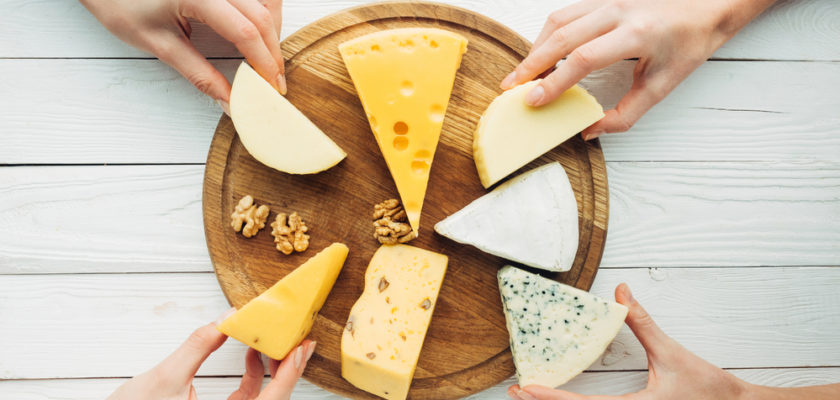Cheese can be absolutely delicious, but with mental images of stuffed crust pizzas and cheese slices oozing out of a greasy hamburger, it’s easy to think of this food source as particularly unhealthy.
Not only that, but the high fat content in many cheeses, lots of which is saturated, means the general population has associated cheese as something that doesn’t play a huge role in a healthy lifestyle.
Luckily, it’s now been confirmed that saturated fat isn’t actually all that bad [1] [2]! Grate stuff.
Cheese is also a fantastic option for those wanting to increase their protein intake, whether you’re vegetarian or just want a boost of protein in your diet, the protein is cheese is what’s known as a complete protein, which the body needs.
A complete protein refers to amino acids, which are the building blocks of protein. There are 20 in total, with nine the body can’t produce on its own.
If you imagine a complete protein as being made up of these 9 amino acids, with each amino acids being a single colour of the rainbow, then cheese, meat, eggs and some other food sources give you all 9 to make a full rainbow.
Other protein sources such as those found in plant based foods, may only give you red and green. Not only this, but cheese is also a great source of calcium, helping maintain strong bones and teeth.
Cheese is also a delicious way to boost the protein of a meal high in green vegetables.
But with over 1,750 different types of cheese available in the world, how do you choose between them all to make sure your fueling your workouts in the most effective way and not just ending up guzzling squirty cheese from a can?
(Guzzling squirty cheese from a can is not recommended….)
We run through the top 3 cheeses for muscle growth to see once and for all, who really is the big cheese.
3. Securing the Bronze… Parmesan

Description
Parmigiano Raggiano, or Parmesan for short, is an extra hard grainy cheese made from cows milk. Adding parmesan to your meals can give you an added nutrient bonus and also improve flavours.
Parmesan goes through a long process of ageing, meaning that lots of the protein is already broken down in peptones, peptides and amino acids, meaning the body can absorb these nutrients with ease.
This long ageing process also means that any lactose is eaten by bacteria [3] – great news for people who are lactose intolerant!
Parmesan is fairly heavy-hitting when it comes to calories, where 100g of parmesan can end up being over 456 calories by itself [4], it’s not simply a bomb of calories though, parmesan clinches third place in the cheesy muscle building world for its huge protein content per 100g with ranges of anywhere between 33% and up to a whopping 42%, making this a cheese of choice for those wanting to put on weight quickly or those who struggle to put on mass.
Bear in mind though that due to the high calorie content, snacking through 1kg of parmesan a day and you’re likely to gain weight wheely fast.
Benefits
- Very high in calories and protein per serving – excellent for those trying to put on mass
- A good source of vitamins (26%, 28% and 50% of your daily recommended intake of vitamins A, B2 and B12 respectively)
- Long aging process makes nutrients easily digestible – so your body can soak up all the goodness with ease
- Great source of calcium (118% of your daily recommended intake) – helping promote strong bones and teeth.
- Virtually lactose free – good news for those who struggle with lactose tolerance
Cooking Ideas
Parmesan is fragrant and tangy, with a hard grainy texture and a buttery yellow colour, it’s pretty tasty and can be bought grated, shaved or as a normal segment of cheese.
With regards to cooking, it’s strong flavour can be excellent for adding a savoury spark to soups, sprinkled over Italian dishes, dusted onto vegetables, shaved into salads or even used to make a coating for chicken.
| Nutrient Breakdown per 100g of cheese. Calories – 388 Protein – 33.0g Fat – 28.4g Carbs – <0.5g Sodium – 1.63g | Nutrient Breakdown per 100 calories. Calories – 100 Protein – 8.51g Fat – 7.31g Carbs – <0.2g Sodium – 0.42g |
2. Taking home the Silver… Cottage Cheese

Description
Cottage cheese is a fresh cheese made from either whole, semi-skimmed or fully skimmed cow’s milk.
The consistency is similar to that of a soft cheese, but with little floating curds in the mixture. It’s often renowned by bodybuilders as the king of cheese and is often listed as one of the top sources of protein, and it’s easy to see why.
With over 15 grams of protein for every 100 calories, this would give you 300 grams of protein if you have 2,000 worth of cottage cheese (but don’t, you’ll probably throw up!).
That being said, it nearly gets the title if it wasn’t for the #1 cheese stepping forward, it does however boast a whole range of attractive benefits, including the fact that it contains a whole range of vitamins, minerals and also tryptophan, which will help you have a more restful nights sleep.
Cottage cheese, however, is most famous in the body building community as it’s an excellent source of casein.
Casein is a slowly digested protein, which gives you a steady supply of protein over a number of hours, it’s particularly effective if consumed before bed as your muscles will be fed while you sleep, which is a much better alternative to waking up in the night for a protein shake!
Benefits
- High amount of protein per calorie – great for keeping up protein intake on a calorie controlled diet
- Great source of casein – a slow releasing protein which drip feeds your muscles overnight
- Contains tryptophan – a nutrient helping you sleep better
- Good source of calcium – promoting strong bones and teeth
- Various flavours helping you mix cottage cheese with different meals.
Cooking Ideas
It’s creamy texture means it can also be used as a dessert, potentially mixed in with mixed berries as a low calorie, high protein dessert with a range of vitamins.
Due to it’s popularity, there are now many different varieties of cottage cheese available, with common types adding chives or pineapple, which increases its versatility, you may wish to add it to a Hawaiian pizza, in a pasta sauce, on top of an avocado, into a cake, or if you fancy it, on its own as a side dish.
| Nutrient Breakdown per 100g of cheese. Calories – 72 Protein – 11.2g Fat – 1.2g Carbs – 3.9g Sodium – 0.43g | Nutrient Breakdown per 100 calories. Calories – 100 Protein – 15.6g Fat – 1.7g Carbs – 5.4g Sodium – 0.60g |
1. Snatching the Gold… Quark

Description
So here it is, the king of the cheese world, Quark. It was a narrow win, with cottage cheese being a worthy competitor, but the much lower levels of sodium (with quark’s salt content a mere third of that of cottage cheese), lower levels of fat and increased levels of protein per 100 calories, this cheese snatches the gold medal, best give the runners up a curdle.
Quark is a soft, white and un-aged cheese made from whey, which is a popular component of the Eastern European diet.
Not all consumers have heard of quark, but this protein powerhouse is sure to gain exposure in the health industry in 2015 and beyond.
Compared to other cream cheeses it has much lower fat and much higher protein. In fact, compared to greek yogurt, quark contains 150% more protein [5].
Similarly with cottage cheese, one of the benefits include a high casein content, making it a great choice for a meal or dessert before bed.
Additionally, it is also a good source of calcium and tryptophan, but where it differentiates itself from cottage cheese is in its low sodium content. Reducing sodium content in the diet improves blood pressure, which is a major risk factor for metabolic disease [6].
Quark like other types of cheese, also contains vitamin K2, which works to keep calcium in your bones and remove it from blood vessels where it may cause blockages.
Benefits
- Highly versatile – it’s neutral taste makes it a great choice for sweet or savoury dishes
- High amount of protein per calorie – great for keeping up protein intake on a calorie controlled diet
- Great source of casein – a slow releasing protein which drip feeds your muscles overnight
- Good source of calcium – promoting strong bones and teeth
- Low sodium content – helping maintain safe blood pressure levels
Cooking Ideas
In terms of taste and texture, quark is very similar to sour cream, as such it can be substituted for sour cream in almost any recipe.
Due to it’s neutral flavour, it’s also fantastic when used as part of a savoury or sweet dish, for example, you may wish to cook it into a healthier version of macaroni and cheese, use it as a dip for parties, mixed into your fajitas or you can even use it for cooking desserts like the cake below.
Nearly anything is possible with this versatile and healthy ingredient, try and experiment with it yourself and share your favourite recipes.
| Nutrient Breakdown per 100g of cheese. Calories – 64 Protein – 11.6g Fat – <0.5g Carbs – 3.7g Sodium – 0.13g | Nutrient Breakdown per 100 calories. Calories – 100 Protein – 18.1g Fat – <0.7g Carbs – 5.8g Sodium – 0.2g |
Get the crackers ready.

The contest is done and the contenders can roll back to the supermarket isles with their labels held high.
From seeing the facts and figures it’s easy to see how cheese can play a sizable role in helping you maintain a lean physique and healthy lifestyle, whether it’s those extra shavings of Parmesan on your pasta, cottage cheese with your evening meal, or a simply delicious quark dessert, all of which will give you that extra protein to support muscle development.
How are you going to fit more of the champions of cheese into your diet?
Cheeses used for nutritional values:
Shaved Parmigiano Reggiano D.O.P. (by Sainsbury’s)
Natural Cottage Cheese (Sainsbury’s be good to yourself range)
Quark (Sainbury’s be good to yourself range)
If you’re looking to supplement your muscle and strength gains even further, be sure to pick the right protein shake too and check out this strength building bodyweight circuit.
Have a friend who loves cheese?
Or maybe wants to mix up their diet as they build muscle?
Then why not share this article on Facebook? 🙂
References:
[1] Saturated fat heart disease ‘myth’ – http://www.bbc.co.uk/news/health-24625808[2] New study puts the final nail in the ‘saturated fat causes heart disease’ coffin – http://chriskresser.com/new-study-puts-final-nail-in-the-saturated-fat-causes-heart-disease-coffin
[3] Cheese on a low-lactose diet – http://www.foodsmatter.com/allergy_intolerance/lactose_intolerance/articles/low_lactose_cheese.html
[4] 36 Cheeses Highest in Protein – http://www.healthaliciousness.com/articles/36-cheeses-highest-in-protein.php
[5] Quark: The Ultimate High-Protein Dairy Product? – http://www.nutraceuticalsworld.com/blog/marketwatch/2013-07-08/quark-the-ultimate-high-protein-dairy-product
[6] Effect of longer-term modest salt reduction on blood pressure – http://www.ncbi.nlm.nih.gov/pubmed/23558162

